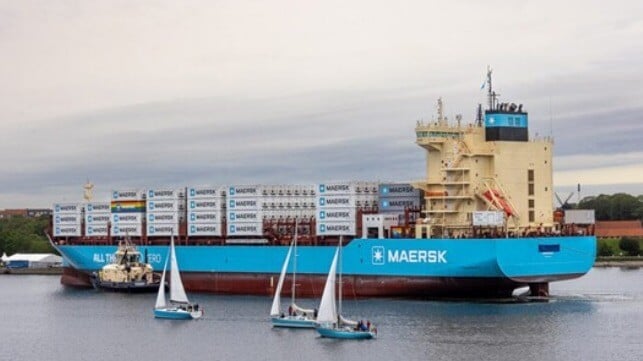Maersk Joins with LR and CORE to Study Nuclear-Powered Container Shipping

Maersk is joining in with a collaboration between Lloyd’s Register and CORE Power that could provide the long-term pathway for nuclear-powered commercial shipping. Using a feeder containership operating in a European port, the collaboration will determine the safety and regulatory considerations and necessary framework for nuclear-powered commercial shipping based on a fourth-generation nuclear reactor.
“The initiation of this joint study marks the beginning of an exciting journey towards unlocking the potential of nuclear power in the maritime industry, paving the way for emissions-free operations, more agile service networks, and greater efficiency through the supply chain,” said Nick Brown, CEO of Lloyd’s Register.
Lloyd’s Register has been at the forefront of the ongoing discussion on the potential of nuclear power in the future of commercial shipping. There was excitement about the potential for nuclear power in the 1950s with the United States leading the way by developing the cargo-passenger ship NS Savannah as a prototype to demonstrate the potential. Then as now, however, public perception and fears of nuclear power held back the development as well as rumored opposition from the U.S. Navy that feared commercial initiatives might interfere with its developing nuclear programs. Only a handful of nuclear merchant ships were built with Russia the only one to still have a merchant ship and nuclear-powered icebreakers in service.
Exploring the potential of nuclear-powered vessels, Lloyd’s Register in its Fuel for Thought series highlighted the rise of small modular reactors as a “step change” for nuclear application. The success of naval applications and new technologies LR says are laying the groundwork for nuclear-powered shipping. Its study highlights the role of small modular reactors in bringing to market suitable low-maintenance reactors.
To reflect the growing maritime industry focus, LR in its latest edition of its Zero-Carbon Fuel Monitor evaluated five nuclear technology categories up from three in 2023. It added to the assessment in 2024 high-temperature gas reactors and liquid metal cooled reactors joining pressurized water reactors (PWRS) micro-reactors (heat pipes), and molten salt reactors.
“Nuclear power holds a number of challenges related to for example safety, waste management, and regulatory acceptance across regions, and so far, the downsides have clearly outweighed the benefits of the technology,” commented Ole Graa Jakobsen, Head of Fleet Technology at A.P. Moller – Maersk. “If these challenges can be addressed by development of the new so-called fourth-generation reactor designs, nuclear power could potentially mature into another possible decarbonization pathway for the logistics industry 10 to 15 years in the future.”
CORE Power which has been leading in the development of the new technologies asserts that “There is no net-zero without nuclear.” They highlight the applications for floating nuclear power plants and nuclear-powered ships.
The collaboration which will also include a port authority will work on a joint study that will investigate the requirements for updated safety rules along with the improved operational and regulatory understanding that is needed for the application of nuclear power in container shipping. In addition, the study will provide insight for members of the maritime value chain who are exploring the business case for nuclear power to help shape their fleet strategy towards achieving net-zero greenhouse gas emissions.
This is the latest in a series of projects each looking at the potential of nuclear power for merchant shipping. In 2022, the U.S. Department of Energy commissioned ABS to conduct a study exploring the potential and challenges of nuclear-powered shipping.
No comments:
Post a Comment